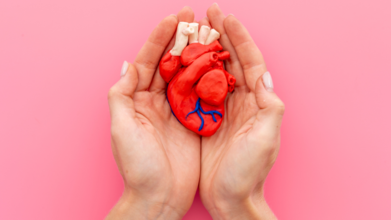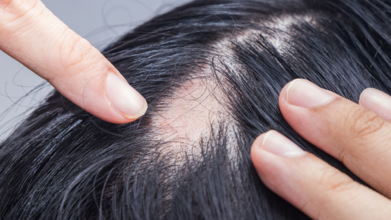- Health Conditions A-Z
- Health & Wellness
- Nutrition
- Fitness
- Health News
- Ayurveda
- Videos
- Medicine A-Z
- Parenting
- Web Stories
What Are Chemosignals? How Do They Impact You?

Credit: Canva
Have you ever entered a room and instantly felt uneasy or uplifted, even without any apparent reason? Science suggests there may be a biological explanation for this phenomenon. Emily Mcdonald, a neuroscientist and brain recently highlighted the role of chemo signals—subtle chemical cues that linger in an environment long after people have left.
These chemo signals, which are released through bodily secretions like sweat, can remain in a space for an extended period. When new individuals enter the same environment, they may unconsciously absorb these cues, influencing their emotions and behavior. According to the study, people often experience anxiety or joy upon entering a room, depending on the emotional state of those who previously occupied it.
This response is closely tied to the way our olfactory system functions. Unlike other sensory inputs, scent-based signals can bypass conscious thought and directly activate the limbic system—a part of the brain responsible for emotions, memory, and instinctive behavior. This means that without even realizing it, we may start feeling a certain way simply because of the chemo signals present in our surroundings.
The implications of this research emphasize the importance of our environment and the company we keep. If emotional states can be chemically imprinted in a space, it becomes even more crucial to create positive atmospheres at home, work, and social settings. Understanding how our surroundings influence us at a subconscious level could be key to improving mental well-being and fostering healthier interactions.
While further research is needed to explore the extent of chemo signal influence, this study sheds light on a fascinating aspect of human perception—one that suggests our ability to "sense the vibes" of a room may not be as mystical as it seems, but rather, deeply rooted in science.
Meanwhile, research says that the human body is far more perceptive than that and there have been lesser-known senses like equilibrioception, which helps us maintain balance, proprioception, which allows us to know where our body parts are without looking, and chronoception, our ability to perceive the passage of time.
And these extra senses are just for humans, there are other species that have sensory reception that we cannot even fathom. For instance, honeybees have iron oxide in their abdomen that allows them to detect shifts in the Earth's magnetic field, helping them navigate back to their hive. Birds and some sea creatures also use magnetic sensing to migrate across vast distances.
For centuries, the idea of a "sixth sense" has captivated human imagination. While traditionally used to describe an unknown or supernatural ability. However, certain researchers have argued that it could be better understood as an "X sense" or something that is still undiscovered. It could also refer to a heightened form of perception.
In Indian philosophy, the mind itself, or "manas," is often considered a sixth sense, coordinating our primary five senses with other cognitive functions. Western cultures, on the other hand, often equate the sixth sense with extrasensory perception (ESP) or intuition. In Celtic traditions, it was known as "second sight," believed to allow some individuals to predict events, including impending death.
When Hair Falls, Look at Your Plate: Why Sudden Thinning Could Be a Nutrient SOS

We have all had that mini meltdown finding a clump of hair in the shower drain or a brush full of hair after combing hair. While blaming stress or the changing seasons feels comforting, experts warn that your body might be sounding a nutritional alarm. Yes, your hair loss might be less about the weather and more about what is missing from your plate.
Listen to What Your Body’s Saying
“Seeing a lot of hair strands on your pillow cover feels distressing,” says Dr Khushboo Jha, MBBS, MD, Chief Dermatologist Consultant at Metro Hospital and Founder of One Skin Clinic, Faridabad, “but you need to listen to your body. It’s the way it communicates that your body is struggling with some deeper concern, probably nutrient deficiency.”
Hair, it turns out, is a high-maintenance tissue. It’s fast-growing and metabolically active, demanding a steady supply of nutrients. But it’s not considered essential for survival. So in times of nutritional crisis, your body reroutes vitamins and minerals to more important organs like your heart or brain, leaving your hair stranded without support.
“If your diet is insufficient, especially lagging in iron, vitamin D, Vitamin B complex such as vitamin B12 and biotin, zinc, protein, etc., hair will be the first one to suffer,” says Dr Jha.
Why Vegans, Crash Dieters, and IBS Patients Should Pay Extra Attention
The hair-nutrition connection is especially crucial for those following restrictive diets. Dr Jha warns that vegetarians and vegans “may unknowingly miss out on essential nutrients, particularly iron and protein, leading to diffuse thinning or excessive shedding.”Dr Ameesha Mahajan, Cosmetic Dermatologist and Founder of Eden Skin Clinic, agrees. “Vegetarians or vegans are more prone to deficiencies, especially when it comes to vitamin B12, iron and protein deficiency,” she says. And it’s not just about what you eat, but also how well your body absorbs it. “Impaired gut absorption disorders such as coeliac disease or IBD… can lead to extreme hair thinning,” Dr Mahajan adds.
Crash diets and eating disorders like bulimia nervosa don’t do your strands any favours either. These behaviours disrupt the body’s nutritional balance and can prematurely push hair into the shedding phase.
The Medical Jargon You Didn’t Know You Needed: Telogen Effluvium
One particular fallout of nutrient shortfalls is telogen effluvium, a name for hair falling out sooner than it should. Dr Mahajan points to iron deficiency anaemia as a common trigger. “It is strongly associated with telogen effluvium, a condition where hair prematurely enters the shedding phase,” she explains.
In other words, if you’ve been feeling unusually tired and your hair is thinning, it might be more than a coincidence; it could be low iron or another nutrient throwing your hair growth cycle off track.
Don’t Pop Just Any Pill
Before you go on a supplement shopping spree, both experts urge caution. “Before self-prescribing supplements, experts urge a full nutritional workup to identify what’s missing,” says Dr Jha. Overloading on certain vitamins can do more harm than good.
Dr Mahajan agrees. “It’s best to get blood parameters checked for any nutrient deficiencies before beginning any supplement to be sure.”
So yes, multivitamins are tempting but flying blind could backfire. Know what you’re low on before topping up.
Eat for Your Hair: What to Load on Your Plate
Both dermatologists suggest nourishing your scalp from within. Dr Jha recommends “a diet loaded with whole grains, legumes, millets, dairy products, nuts, seeds, etc.,” noting these support not only hair health but also overall wellbeing.
Dr Mahajan says that these foods “help to restore the lost nutrients, making the hair denser and thicker.” Think of them as edible armour for your follicles.
Still Losing Hair? Time to Dig Deeper
If your hair continues to vanish despite eating all the right things, don’t ignore it. “If still you face symptoms, consult a dermatologist for ruling out hormonal or other health conditions,” advises Dr Jha.
Dr Mahajan adds, “If you still suffer from hair fall, despite making changes in your diet, it’s time to consult a dermatologist, as it might be due to some hormonal disruption or any other autoimmune-related cause.” Because sometimes, hair loss isn’t just about what’s missing but what’s going wrong beneath the surface.
We Can Predict Heart Attacks Before They Happen, So Why Are We Not Doing It?

Heart disease remains one of the leading causes of death globally, and while technology has evolved to the point where predicting heart attacks is possible, the medical world still struggles to put this into practice. Experts point to both promise and pitfalls in predictive cardiology, revealing why such life-saving tech is not yet a mainstream reality.
The Tech Is Here, But We Are Not Using It Enough
Dr. Vikrant B. Khese, Cardiologist at Jehangir Hospital, Pune, says the idea that we can predict heart attacks before they happen is both “exciting and frustrating, because while the technology exists, its real-world implementation remains limited.”
He explains that artificial intelligence (AI) and machine learning (ML) have incredible potential in this field. These tools can analyse vast datasets, such as blood pressure, lipid profiles, ECGs, imaging, and even genetic markers, to uncover patterns that might be invisible to the human eye. “These tools can detect subtle risk factors that may be missed in routine clinical practice. However, several challenges continue to hold us back,” he says.
One of the biggest concerns is the source of the data feeding these algorithms. “The majority of AI models are trained on Western datasets that do not reflect the unique genetic, environmental, and lifestyle factors of Indian or Asian populations. This creates a mismatch, resulting in lower accuracy and reliability for non-Western patients.”
Dr. Khese adds that cardiovascular disease is deeply multifactorial. It is not just about clinical metrics. “Stress, socioeconomic status, cultural diet patterns, air pollution, and unstructured physical activity all influence risk but are difficult to quantify in a dataset. AI still struggles with these intangible but crucial variables.”
And even when predictive tools are developed, another hurdle lies in the healthcare system’s ability to use them. “Data-driven predictions can only be as good as the data input. In India, inconsistent electronic medical records, underreporting, and fragmented healthcare systems make it harder to gather high-quality longitudinal data, limiting the AI's learning potential.”
Crucially, there is also a behavioural gap. “Even when prediction tools exist, they are not routinely used by clinicians due to scepticism, lack of training, or workflow disruption. Bridging the gap between innovation and implementation is a major hurdle.”
According to Dr. Khese, technology must complement clinical judgement, not replace it. “AI is a powerful tool but not a standalone solution. Until we combine high-quality, representative data with clinical wisdom and system-level integration, the promise of predicting heart attacks before they happen will remain underutilised. The future lies in synergy; technology must empower doctors, not replace them.”
Prediction Tools Exist—But We’re Waiting for Symptoms
Dr. Vijay D'Silva, Medical Director of White Lotus International Hospital and Clinical Advisor and Mentor of Heartnet India, backs this view and draws attention to major international trials. “Research from the University of Oxford has suggested that a global trial of an AI tool that can predict the 10-year risk of heart attack has shown that in about 45 per cent of patients with chest pain, treatment could be improved,” he shares.
“Early detection of cardiac risk allows timely treatment and monitoring that can help reduce the mortality rate,” he says, explaining that most coronary blockages are asymptomatic. “Some present with chest, arm or jaw pain on exertion (angina pectoris). Few present as a heart attack or sudden death. People seek treatment after a heart attack when the damage is already done.”
According to Dr. D’silva, “With the help of the right tools, it is now possible to predict a heart attack before it occurs.” Among these tools are blood tests, ECGs, and advanced risk calculators such as the AHA PREVENT calculator, ASCVD Risk Calculator Plus, QRISK3, and SCORE2.
He points out how the 2023 AHA PREVENT calculator estimates 10-year cardiovascular risk in individuals aged 30 to 79, and 30-year risk in adults aged 30 to 59. “Early-stage detection of CVD minimises the cost and also reduces the CVD mortality rate,” he says.
This tool divides patients into four risk categories, each with its own treatment strategy:
- Low risk (<5%): Maintain healthy lifestyles and reassess every five years.
- Borderline risk (5–7.4%): Lifestyle changes and monitoring of risk-enhancing factors like BP, sugar, weight and lipids. CAC scoring can further stratify risk. Annual reassessment recommended.
- Intermediate risk (7.5–19.9%): Calls for lifestyle management, preventive medication (statins or aspirin), stress testing and CT coronary angiogram. Yearly reassessment is needed.
- High risk (≥20%): Requires intensive lifestyle changes, pharmacotherapy, imaging and close follow-up.
Despite these advances, Dr D'Silva says, “The gap lies in implementation. Most people still wait for the symptoms to appear before seeing a doctor. Heart attacks, unfortunately, strike without any warning, especially in women and younger patients, where symptoms can be atypical.”
He stresses that predictive cardiology is not yet standard in clinical practice. “People who are at risk seek care when symptoms arise. But in cardiology, symptoms often come too late. Up to 50 per cent of heart attack victims had no prior warning signs.”
Why Risk Calculators Are NotFoolproof
While risk calculators are promising, Dr. D’silva also points out their limitations. “The risk calculator may underestimate the risk in the following situations,” he says, listing specific high-risk groups such as:- Patients with LDL cholesterol ≥190 mg/dL
- Those with familial hypercholesterolemia
- Patients with type 1 diabetes
- People with other risk-enhancing factors like family history of early cardiovascular disease, metabolic syndrome, chronic kidney disease, chronic inflammatory diseases (psoriasis, RA, lupus), or early menopause
The Way Forward
Both experts agree: predictive tools are no longer science fiction, but adoption is patchy. As Dr. Khese puts it, “The future lies in synergy; technology must empower doctors, not replace them.”Dr. D'silva concludes, “The ability to predict heart attacks is advancing continuously, but we need public awareness and equitable access to make predictive cardiology more standard.”
In short, we can predict heart att but until we normalise risk screening, improve data systems, and bridge the clinical gap, too many heart attacks will continue to catch people and systems off guard.
World Alopecia Day: Experts Bust Popular Myths and Reveal Hidden Health Issues Behind Hair Loss

When strands clog your shower drain or your brush looks full every time you run it through your hair, panic is a natural response. Hair loss, or alopecia, is not just a cosmetic concern; it often hints at something deeper. And yet, thanks to internet half-truths and old wives’ tales, myths about alopecia spread faster than a viral meme. On World Alopecia Day, we turn to experts to separate fact from fiction while spotlighting the hidden medical conditions that might be behind the hair fall.
It is Not Just "Shedding Season": Medical Reasons Behind Hair Loss
Alopecia does not always pop up on its own. According to Dr Jijith K Ravindran, Chief Cosmetologist and Dermatologist at Cosmalife Skin Clinic in Bengaluru, alopecia often walks hand in hand with other medical conditions, and sometimes, it is your body’s way of waving a red flag.Autoimmune Disorders (Alopecia Areata):
Dr Ravindran explains, “In this condition, the immune system mistakenly attacks healthy hair follicles, leading to patchy hair loss on the scalp or other body parts.” It is unpredictable, affects people of all ages, and may be triggered by stress or genetics. If you have noticed coin-sized bald patches cropping up suddenly, your immune system could be the rogue agent.Hormonal Imbalances (Thyroid Disorders and PCOS):
Blame it on your hormones? Sometimes, yes. “Both hypothyroidism and hyperthyroidism can disrupt the hair growth cycle, causing diffuse hair thinning,” says Dr Ravindran. Women with PCOS are especially vulnerable. “Elevated androgen levels in PCOS weaken hair follicles, leading to noticeable hair fall.” It is not uncommon for women with irregular periods or acne to also see their hair thinning.Nutritional Deficiencies:
Crash diets might help you drop pounds, but they can also drop your hair count. “Low levels of iron, vitamin D, and essential proteins can contribute to excessive hair shedding,” warns Dr Ravindran. If your plate lacks balance, your scalp might pay the price.The good news? “Early diagnosis and treatment of these conditions can help restore hair growth and prevent permanent damage,” he assures.
Wigging Out Over Myths
Even as more people talk openly about hair loss, alopecia still suffers from a major PR problem, mostly due to persistent myths. Dr Roopam Gangurde, a dermatologist with an MD in Skin & VD, breaks down the most common fallacies that often do more harm than good.Myth 1: “Only men experience alopecia.”
“While male pattern baldness is more commonly discussed, women are equally susceptible to alopecia due to hormonal imbalances, thyroid issues, and nutritional deficiencies,” says Dr Gangurde. Yes, ladies lose hair too and not just from brushing too hard.
Myth 2: “Stress alone is responsible for hair loss.”
While stress is definitely not good for your scalp’s health, it is not the lone cause. “Alopecia usually has multiple triggers, including genetics, autoimmune conditions, and underlying medical issues,” explains Dr Gangurde. Translation: stressing about stress causing hair fall might make things worse.
Myth 3: “Alopecia is always permanent and untreatable.”
This one might be the most damaging myth of all. “Many forms of hair loss, especially those caused by hormonal or nutritional factors, are reversible with timely medical intervention,” says Dr Gangurde. PRP therapy, medications, and lifestyle changes can all turn things around if you act early enough.
Do Not Just Shed Tears, Seek Help
If your hair has been thinning or falling out in clumps, resist the urge to DIY it with oils, serums, or social media hacks. “If you experience sudden or persistent hair loss, consult a dermatologist or trichologist promptly,” advises Dr Gangurde. “Early intervention can address the root cause, prevent progression, and in many cases, restore healthy hair growth.” Remember that alopecia is not just a surface-level issue. And with the right diagnosis, it is often more fixable than you think.
© 2024 Bennett, Coleman & Company Limited

